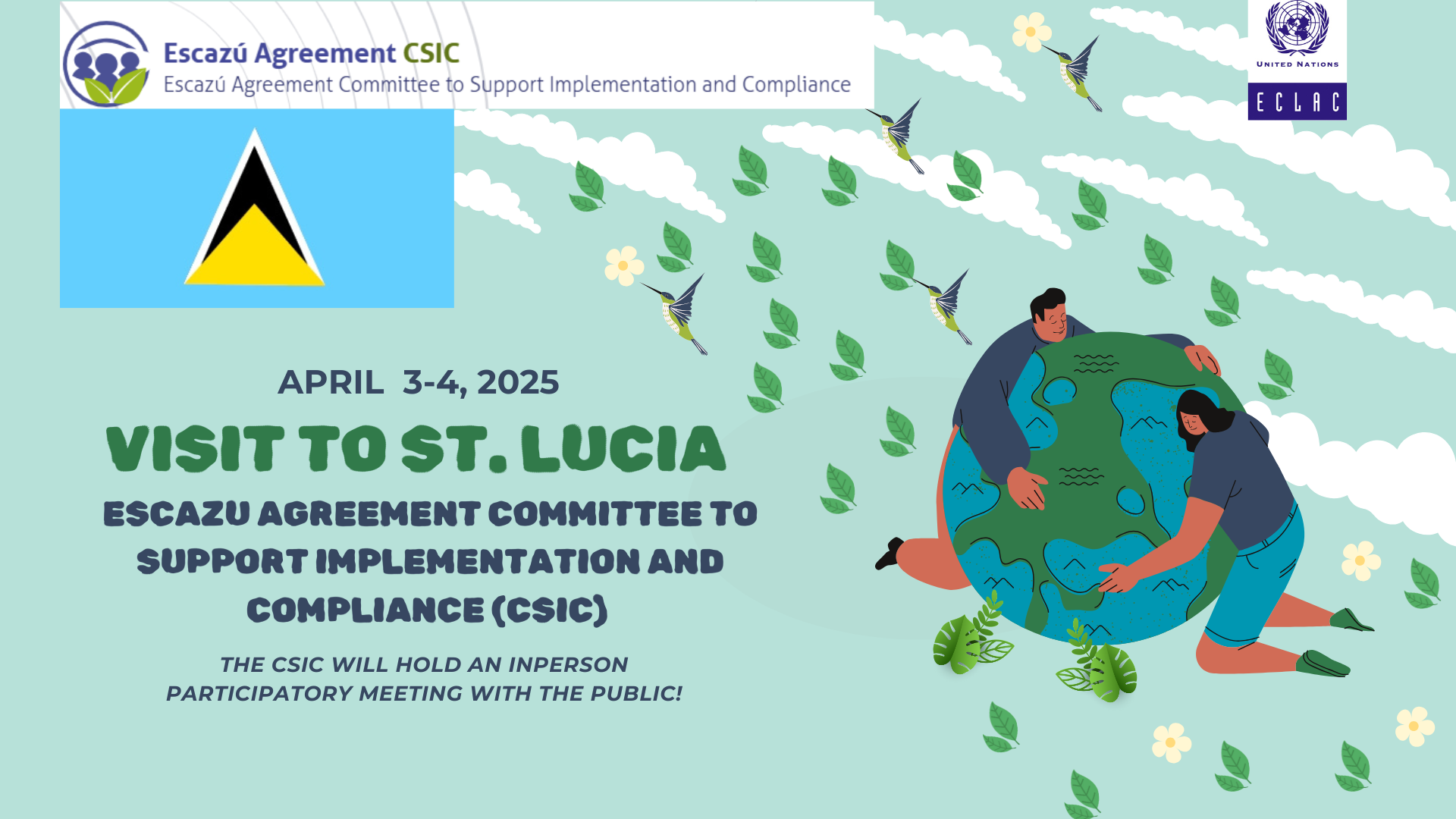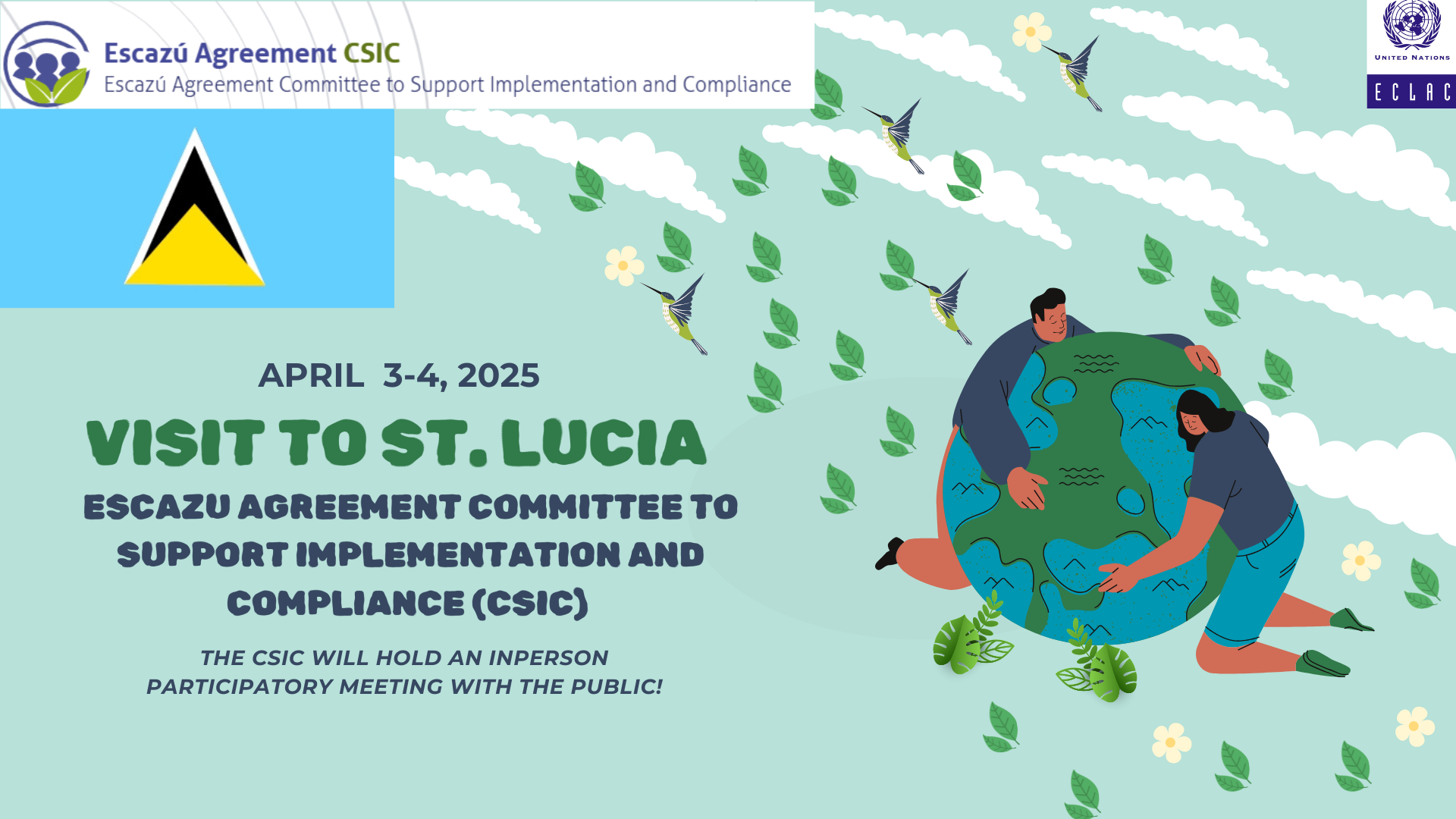The visit of the Committee to Support the Implementation and Compliance of the Escazú Agreement to Saint Lucia comes to a positive close, underscoring the country's leadership in the Caribbean
Work area(s)
Topic(s)

The Committee to Support the Implementation and Compliance of the Escazú Agreement, as part of its consultative and dialogue role with the Parties, visited Saint Lucia from 3 to 4 April 2025.
Preparation of the visit
Prior to the visit, a list of topics for consultation and dialogue was developed and agreed upon by Saint Lucia and the Committee (see the agreed agenda here). The visit was announced on March, 12 on the websites of the Escazú Agreement and the Committee, along with the agreed agenda. Subsequently, to support the Committee in its preparations, questionnaires were sent to public institutions in Saint Lucia, and a public consultation was launched through an online questionnaire, which remained open from 18 March to 11 April 2025.
Dialogue with authorities and the public
During the two-day visit, the Committee held 11 meetings with high-level authorities, department heads, and officials from various government branches and institutions, including the Department of Sustainable Development, the Attorney General’s Chambers, the Ministry of Youth Development and Sports, the Department of Gender Relations, the Chief Justice of the Eastern Caribbean Supreme Court and judicial operators, the Department of Physical Planning, the Ministry of Equity, the Senate, the House of Assembly, the Environmental Health Department, among many other professionals who contributed and enriched the dialogue with their insights.
An open participatory session was also held for the public, both in-person and virtually.
At the closing session of the visit, the Committee commended Saint Lucia for being "the first Caribbean Party with which it has engaged in dialogue and carried out an official visit following a formal invitation; and it has also been the first in the Caribbean subregion to publish a roadmap for the implementation of the Escazú Agreement." The Committee highlighted “its efforts to integrate and guarantee the access rights enshrined in the Agreement through the establishment of two key mechanisms: a core group (Subcommittee of the National Human Rights Coordinating Committee), responsible for developing and guiding the Implementation Plan for the Escazú Agreement, and an expanded group of public authorities and other stakeholders (Stakeholder Advisory Committee), which may issue recommendations and support the dissemination of information on the Agreement.”
The Committee also shared a preliminary assessment of the two agreed agenda items that guided its visit:
On public participation in environmental decision-making processes that may have a significant impact on the environment (Article 7.2), the Committee highlighted the country’s efforts to implement the Agreement’s provisions, while noting areas that still require further development.
On the means for disseminating information on access to justice and the procedures to make it effective (Article 8.4), the Committee welcomed the initiatives implemented to educate and raise awareness on this access right, and encouraged further capacity-building efforts.
Following the visit, and as part of the Third Forum on Human Rights Defenders in Environmental Matters in Latin America and the Caribbean, the Committee held a meeting with the OECS representative present at the Forum, with the aim of discussing the support and relationship between the OECS and Saint Lucia, with a view to strengthening the implementation of the Escazú Agreement in the Caribbean subregion.
Next steps
Although the Committee has concluded its first visit to Saint Lucia, the consultation and dialogue process will continue. In this regard, and in accordance with its working modalities, the Committee will prepare a preliminary report to be shared with Saint Lucia in the coming months, granting an eight-week period for comments. The Committee will then proceed with the drafting of the final consultation and dialogue report, which will include its conclusions and relevant recommendations.
Lastly, dialogue with the Parties to the Agreement is periodic and ongoing, and will take place at least every four years with each Party, as established in the Committee’s working modalities.
Related content
Country(ies)
-
Saint Lucia

